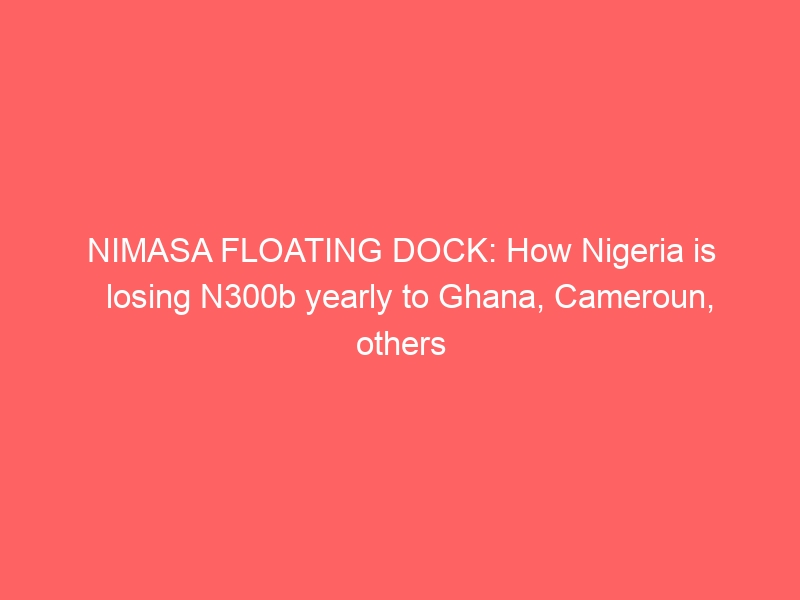In what is gradually becoming a national embarrassment, Nigeria has continued to lose an average of N300 billion ($600 million) yearly to neighbouring Ghana and other countries over inability to put its modular floating dock into use.
In 2018, a N50 billion floating dock was acquired by the Nigerian Maritime Administration and Safety Agency (NIMASA) with the intension of curbing capital flight, create jobs and generate revenue for the country from the thousands of vessels sailing to Nigerian port yearly apart from floating vessels, coastal vessels and trawlers.
According to Nigerian Port Authority (NPA)’s data, a total of 3,972 vessels called at Nigerian waters in 2020, while 4,251 vessels sailed to the port in 2019.
Findings from ship owners revealed that over 1,200 vessels out of those that operate within Nigeria’s territorial waters were forced to Ghana, Cote d’Ivoire, Senegal, Cameroun, Namibia and South Africa yearly for docking facilities.
According to International Maritime Organisation (IMO), every vessel must dry-dock once every three years to enable it retain safety classification and insurance cover.
Ship owners said that it costs between $300,000 and $500,000 to dry-dock a vessel, while it costs between $1.5 million and $1.8 million to tow a vessel to Singapore or other destinations for dry docking.
They noted that some ships had been grounded due to the inability of their owners to secure foreign exchange at the Central Bank of Nigeria (CBN)’s official window for repairs in other countries.
After much complaints, in June 2020, NPA and NIMASA agreed to berth floating dock at the Authority’s abandoned Continental Shipyard, Apapa, in order to make it functional and earn a huge amount of revenue.
However, the agreement to put the modular floating dock into use has suffered a setback one year after, as nothing has been heard about it despite assurance by the Director-General of NIMASA, Dr. Bashir Jamoh, that the floating dock would be operational by the end of July, 2020.
Before the new development, NPA had indicated the intention to auction its shipyard after the joint-venture agreement expired in 2018 between the Authority and Dockyard Engineering Service of Geneva, Switzerland, which gave birth to Continental Shipyard Limited (CSL).
It was learnt that the dockyard, which had not been working since 2010, has been abandoned, vandalised and rendered a scrap.
Currently, NIMASA’s floating dock, built by Damen Shipyards and its partner, NIRDA, in Amsterdam, the Netherlands, which has the capacity to employ over 300 Nigerian youths directly, is rotting away on Nigeria waters. Nigeria has only one ship building yard located in Onne in Rivers State, while there are other small yards, which could build barges and fibre glass.
According to a former President of Ship Owners Association of Nigeria (SOAN), Greg Ogbeifun, the country needs higher capacity ship repair yards to curb capital flight.
He noted that ship building was relatively non-existent in the country.
Ogbeifun said a lot of jobs and revenue were lost when vessels leave the country for dry-docking facilities elsewhere.
He said: “These jobs would have been created in Nigeria if there were operational ship repair yards in the country. Dry docking of vessels outside the country hinders the country’s opportunities for skill and technology transfer.
“The continuation of this practice means that Nigeria will never improve its capacity to repair vessels, which in turn diminishes the possibility of ship building in the country. Eighty per cent of the vessels leave the country to carry out their docking repairs.”
Ogbeifun, who is also the Chief Executive Officer, Starzs Shipyard Limited, lamented in Lagos that there was no shipyard in the country that could take a 30,000 tonnes oil tanker.
He told this newspaper that the sector ought to be making a substantial contribution to the country’s income, saying that the loss to the sector was estimated to be over $500 million per annum.
Ogbeifun explained that ship repair was an expensive operation, stressing that most ship owners preferred to dry dock their vessels within the confines of the routes they operate.
Contents
- In what is gradually becoming a national embarrassment, Nigeria has continued to lose an average of N300 billion ($600 million) yearly to neighbouring Ghana and other countries over inability to put its modular floating dock into use.
- In 2018, a N50 billion floating dock was acquired by the Nigerian Maritime Administration and Safety Agency (NIMASA) with the intension of curbing capital flight, create jobs and generate revenue for the country from the thousands of vessels sailing to Nigerian port yearly apart from floating vessels, coastal vessels and trawlers.
- According to Nigerian Port Authority (NPA)’s data, a total of 3,972 vessels called at Nigerian waters in 2020, while 4,251 vessels sailed to the port in 2019.
- Findings from ship owners revealed that over 1,200 vessels out of those that operate within Nigeria’s territorial waters were forced to Ghana, Cote d’Ivoire, Senegal, Cameroun, Namibia and South Africa yearly for docking facilities.
- According to International Maritime Organisation (IMO), every vessel must dry-dock once every three years to enable it retain safety classification and insurance cover.
- Ship owners said that it costs between $300,000 and $500,000 to dry-dock a vessel, while it costs between $1.5 million and $1.8 million to tow a vessel to Singapore or other destinations for dry docking.
- They noted that some ships had been grounded due to the inability of their owners to secure foreign exchange at the Central Bank of Nigeria (CBN)’s official window for repairs in other countries.
- After much complaints, in June 2020, NPA and NIMASA agreed to berth floating dock at the Authority’s abandoned Continental Shipyard, Apapa, in order to make it functional and earn a huge amount of revenue.
- However, the agreement to put the modular floating dock into use has suffered a setback one year after, as nothing has been heard about it despite assurance by the Director-General of NIMASA, Dr. Bashir Jamoh, that the floating dock would be operational by the end of July, 2020.
- Before the new development, NPA had indicated the intention to auction its shipyard after the joint-venture agreement expired in 2018 between the Authority and Dockyard Engineering Service of Geneva, Switzerland, which gave birth to Continental Shipyard Limited (CSL).
- It was learnt that the dockyard, which had not been working since 2010, has been abandoned, vandalised and rendered a scrap.
- Currently, NIMASA’s floating dock, built by Damen Shipyards and its partner, NIRDA, in Amsterdam, the Netherlands, which has the capacity to employ over 300 Nigerian youths directly, is rotting away on Nigeria waters. Nigeria has only one ship building yard located in Onne in Rivers State, while there are other small yards, which could build barges and fibre glass.
- According to a former President of Ship Owners Association of Nigeria (SOAN), Greg Ogbeifun, the country needs higher capacity ship repair yards to curb capital flight.
- He noted that ship building was relatively non-existent in the country.
- Ogbeifun said a lot of jobs and revenue were lost when vessels leave the country for dry-docking facilities elsewhere.
- He said: “These jobs would have been created in Nigeria if there were operational ship repair yards in the country. Dry docking of vessels outside the country hinders the country’s opportunities for skill and technology transfer.
- “The continuation of this practice means that Nigeria will never improve its capacity to repair vessels, which in turn diminishes the possibility of ship building in the country. Eighty per cent of the vessels leave the country to carry out their docking repairs.”
- Ogbeifun, who is also the Chief Executive Officer, Starzs Shipyard Limited, lamented in Lagos that there was no shipyard in the country that could take a 30,000 tonnes oil tanker.
- He told this newspaper that the sector ought to be making a substantial contribution to the country’s income, saying that the loss to the sector was estimated to be over $500 million per annum. Ogbeifun explained that ship repair was an expensive operation, stressing that most ship owners preferred to dry dock their vessels within the confines of the routes they operate.
- He noted that if the potential of the ship repair sector were properly harnessed, the sector had the capacity to drive technology acquisition, training opportunities of specialised professionals and employment generation.
- The former SOAN president challenged government to develop and make the steel industry operational.
- Ogbeifun noted that steel industry was critical to the establishment and growth of ship building in the country.
- He added: “Government needs to take a holistic view of all these. Companies that have come to develop this sector in Nigeria have been discouraged owing to unfavorable fiscal policies, which retards the growth of the industry.”












